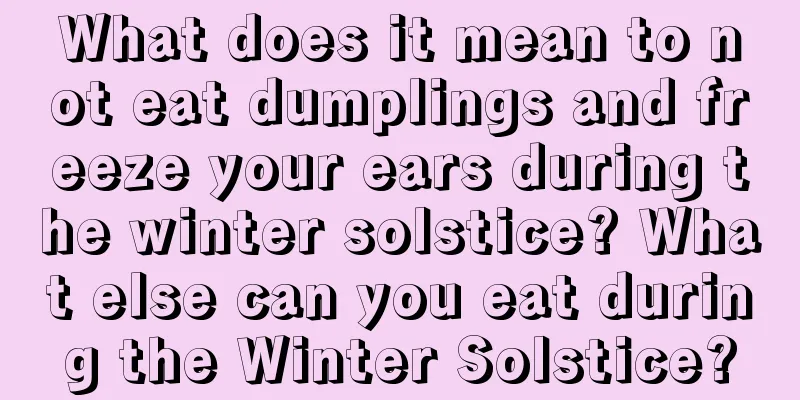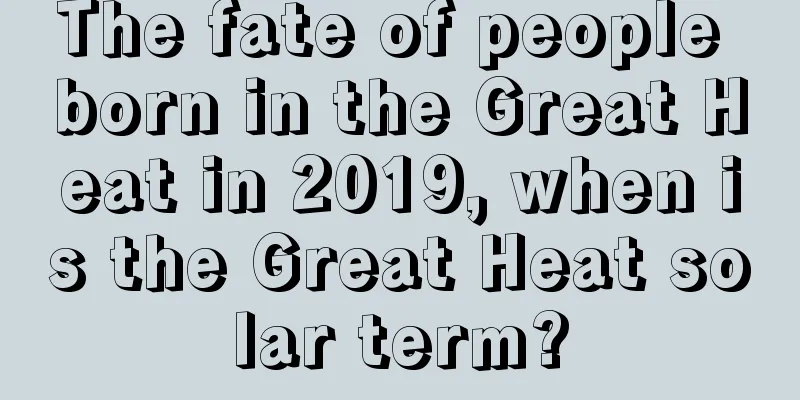What does it mean to not eat dumplings and freeze your ears during the winter solstice? What else can you eat during the Winter Solstice?

The Winter Solstice is also a traditional festival in my country, commonly known as the "Winter Festival", "Longest Day Festival", "Second Year's Day", etc. Until now, many places still have the custom of celebrating the Winter Solstice Festival. What does it mean to not eat dumplings and freeze your ears during the winter solstice? Is it necessary to eat dumplings during the Winter Solstice? Shui Mo Xiansheng website provides you with more relevant articles about November 2018 of the lunar calendar. Let’s come to Shui Mo Xiansheng website to pay attention to November 2018 of the lunar calendar.What does it mean to not eat dumplings and freeze your ears during the winter solstice?In the north of my country, every household eats dumplings on the winter solstice day every year. There is an old saying that goes, "October 1st, the winter solstice arrives, and every household eats dumplings." This custom is to commemorate the "Medical Saint" Zhang Zhongjing who gave away medicine on the Winter Solstice.It is said that during the Eastern Han Dynasty, Zhang Zhongjing resigned from his official position and retired to treat his neighbors. When he returned to his hometown in Nanyang, Henan, it was winter at the time. He saw that the folks on both sides of the Baihe River were pale and thin, suffering from hunger and cold due to poverty, and many people's ears had been frozen. So he asked his disciples to set up a stove and a big pot at the East Gate of Nanyang, and give away medicine to save people and cure everyone's frostbite on the Winter Solstice. He used mutton and some cold-relieving herbs to boil in a pot, then took out and chopped them up, and then used flour to wrap the filling into the shape of ears, called "jiao'er". After cooking, he distributed it to people who came to ask for medicine. Each person could take two "jiao'er" and a bowl of broth. After people ate the "jiao'er" and drank the "cold-relieving soup", they felt warm all over, their ears became hot, and the frostbitten ears slowly healed. Zhang Zhongjing also told everyone how to make this medicine, and everyone then learned to make their own food in the shape of "jiao'er", and then we have the dumplings we have today, which Henan people also call "bianshi". Therefore, there is still a folk song in Nanyang today that goes, "If you don't eat dumplings on the Winter Solstice, your ears will freeze off and no one will care." Although dumplings are no longer a delicacy that we can only eat during festivals, many traditional customs are still preserved. For example, during the New Year in the north, there is a custom of wrapping coins in dumplings. I remember when I was a child, on New Year’s Eve, when making dumplings, adults and children could forget about everything else, but no one would forget the custom of putting coins inside the dumplings. The most interesting thing is that at the New Year’s Eve dinner, everyone scrambles to eat the dumpling with the coin. Whoever finds the coin first will have good luck in the new year. What else can you eat during the Winter Solstice?North: Dumplings and wontons <br /> In Beijing, there is a saying: "Wontons at the winter solstice, noodles at the summer solstice." For northerners who believe that "nothing tastes better than dumplings", it is also a common custom to eat dumplings and wontons during the winter solstice. Eating "Niedong'erduo" is the common name for eating dumplings during the winter solstice in Henan Province. It is said that eating dumplings can prevent people's ears from freezing off in the cold winter.However, people in different places call wontons differently. People in Guangdong call wontons "wontons", people in Hubei call them "baomian", people in Jiangxi call them "clear soup", and people in Sichuan call them "chaoshou". Jiangnan: Tangyuan <br /> There is a saying among the people that "eating tangyuan makes you one year older." Eating glutinous rice balls during the winter solstice is a traditional custom in my country, and is particularly popular in the south of the Yangtze River. Tangyuan is also called "tangtuan", and eating tangyuan during the winter solstice is also called "winter solstice tangyuan". "Winter Solstice Rice Balls" can be used to worship ancestors or given as gifts to friends and relatives. In the old days, Shanghai people were most particular about eating tangyuan. At the family dinner, they taste freshly brewed sweet white wine, flower cakes and glutinous rice balls, and then pile pieces of meat on a plate to offer sacrifice to their ancestors. Ningxia: “Brain” There is a custom in Yinchuan that people drink noodle soup and eat mutton noodle soup dumplings on the day of the winter solstice. However, on the day of the winter solstice, mutton noodle soup is not called mutton noodle soup, but has another strange name - "brain". The head of the household started working early in the morning. He washed the purple mushrooms from Songshan Mountain, boiled the soup, and took out the mushrooms after it was done. He put the diced mutton into the pan and stir-fried it. After it was well-seasoned, he added the chopped mushrooms to the diced mutton and stir-fried it again, then marinated it with vinegar. This pot of soup contains red peppers, yellow day lilies, green garlic sprouts and coriander, white vermicelli and noodles, and black mushrooms and fungus. It has all five colors of red, yellow, green, white and black, and the aroma is so fragrant that it makes people salivate. Zhejiang: Buckwheat noodles <br /> In Zhejiang and other places, every winter solstice, the whole family, young and old, men and women, gather together, and married daughters also rush back to their husband's home. Every household makes buckwheat noodles. It is believed that eating buckwheat during the winter solstice can remove pig hair and chicken feathers from the stomach and intestines. Guizhou: Dog meat <br /> The custom of eating dog meat during the winter solstice is said to have started in the Han Dynasty. According to legend, Emperor Gaozu of Han, Liu Bang, ate dog meat cooked by Fan Kuai on the day of winter solstice and found it tasted particularly delicious and praised it highly. From then on, the custom of eating dog meat during the winter solstice was formed among the people. There is also a saying among the people that "eat dog meat on the Winter Solstice and fight tigers next spring." Now in the north, people in Guizhou and other regions eat dog meat, mutton and various nourishing foods on the day of the winter solstice, because the weather enters the coldest period after the winter solstice. Chinese medicine believes that mutton and dog meat have the effect of strengthening yang and replenishing the body. Therefore, there is still a custom of taking tonic foods on the winter solstice among the people. Fujian: rolling pills "Frost on the winter solstice, the moon is bright; cypress leaves are red, and dumplings are in the arms." This is a nursery rhyme about the winter solstice. The "Eight Fujian Chronicles" records: "In advance, glutinous rice is made into balls, which are ripe early on this day and offered to the ancestors." This is the custom of making balls at night on the Winter Solstice and offering the ripened "sweet balls" to ancestors. The ball-rolling technique is delicate. The women in the fishing villages of Shenhu in Jinjiang, Xiangzhi in Shishi, and Chongwu in Hui'an are very good at making balls with fast speed and good quality. Each ball is as small as a fish eye bead, which is amazing. While rolling the winter festival balls, people also use the rice ball material to make some small and exquisite fruits, animals, gold ingots and silver treasures to symbolize prosperity, auspiciousness and wealth, commonly known as "making chickens, sows and dogs". Taiwan: Nine-layer cake <br /> In Taiwan, the tradition of using nine-layer cake to worship ancestors during the winter solstice is still preserved. Glutinous rice flour is used to shape chickens, ducks, turtles, pigs, cows, sheep and other animals that symbolize good luck, fortune, longevity and happiness. They are then steamed in layers in a steamer and used to offer sacrifices to ancestors to show that they have not forgotten their ancestors. People of the same surname and clan gather at the ancestral temple on the winter solstice or on a date agreed upon before or after it, and worship their ancestors one by one in order of seniority, commonly known as "ancestor worship." After the ceremony, a grand banquet will be held to entertain the relatives who come to worship their ancestors. |
<<: Recommended auspicious days for engagement in November of the lunar calendar 2018!
>>: What activities should we do during the Winter Solstice? How to eat during the winter solstice?
Recommend
Is it good to give birth to a boy on December 22, 2018 in the lunar calendar? Is the hexagram a good sign?
Children are the hope for the family's future....
How about the 27th day of the second lunar month in 2021? OK?
Different days have different good and bad fortune...
What are the auspicious and taboo things in the lunar calendar for June 21, 2020?
June is also known as the hottest month of the ye...
Is it necessary to drink Guyu tea during the Guyu solar term? How should we offer sacrifices to the sea during the Guyu solar term?
Introduction: Guyu is one of the 24 solar terms, a...
What is the solar term Jingzhe? What is the origin of the solar term Jingzhe?
Introduction: The solar terms are one of the ancie...
Is it appropriate to move to a new home on July 19th of the lunar calendar in 2020?
Is it appropriate to move to a new home on July 1...
Is March 18th of the lunar calendar in 2022 an auspicious day? Can I propose marriage?
The third month of the lunar calendar arrives, and...
Is November 22nd of the lunar calendar in 2017 a suitable date for opening a business?
Winter months are cold, but when everything goes ...
Is it true that girls born on the Ghost Festival will bring bad luck to their husbands? What is the fate of girls born on the Ghost Festival?
The Zhongyuan Festival is commonly known as the Gh...
Is it okay to worship ancestors on the 18th day of the fifth lunar month in 2020? What etiquette should be paid attention to during the worship?
Introduction: Generally, it is necessary to choose...
What day is December 16th in the lunar calendar 2020 and what month and date does it correspond to in the new calendar?
What day is December 16th in the lunar calendar 2...
What are the phenological characteristics of the Great Cold solar term? Analysis of the fate of people born in the Great Cold of 2020!
The Great Cold is the last solar term among the 24...
Is it suitable to erect a tombstone on the 17th day of the fourth lunar month in 2019? Is it a good idea to erect a tombstone on the 17th day of the fourth lunar month?
Introduction: erecting a monument is also an impor...
What zodiac sign do people born in August of the lunar calendar in 2018 belong to?
In the eighth month of the lunar calendar, the sky...
Is the fourth day of the fourth lunar month in 2019 an auspicious day for a haircut?
As the days go by, we all know that every day is d...









